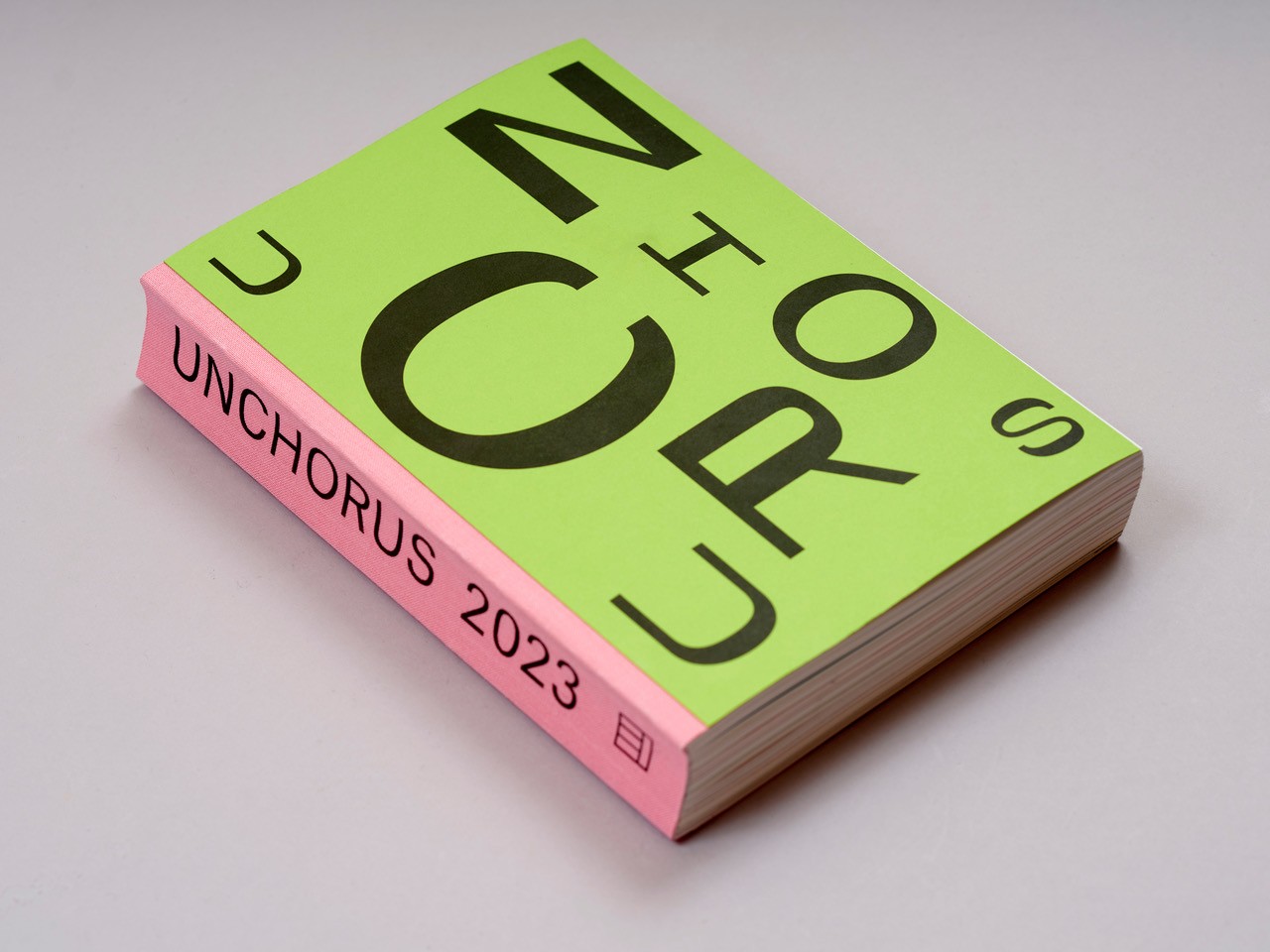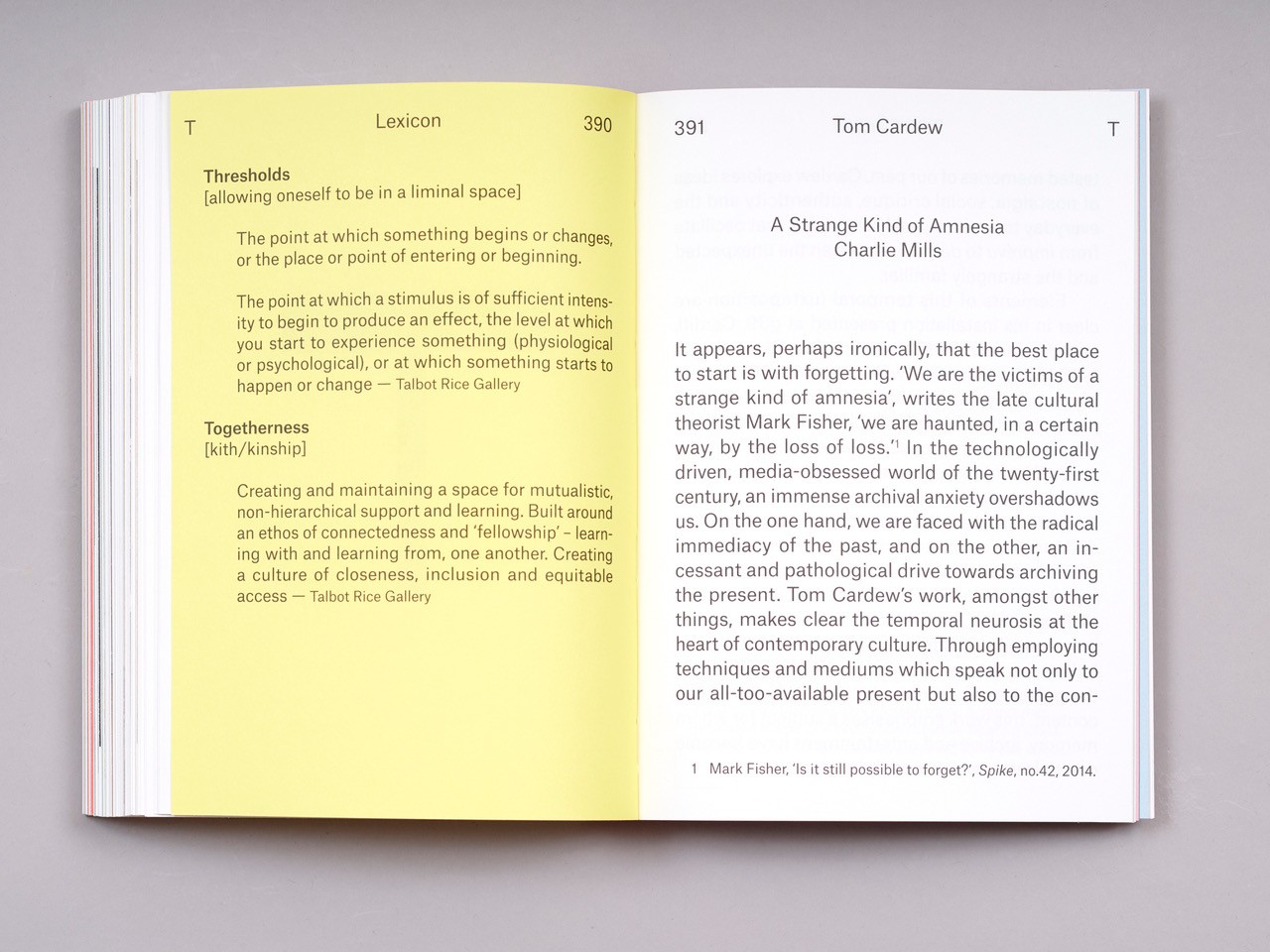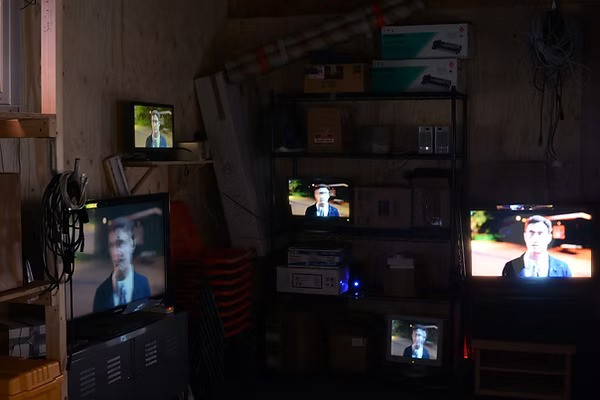Hannah Barry Gallery x Foolscap Editions, London
Editor
2025
Lo Brutto Stahl, Paris & Basel
Exhibition Text
2024
Hannah Barry Gallery x Foolscap Editions, London
Editor
2024
émergent, London
Interview
2024
DUVE, Berlin
Exhibition Text
2024
émergent, London
Interview
2024
Incubator, London
Exhibition Text
2023
QUEERCIRCLE, London
Exhibition Text
2023
L.U.P.O., Milan
Catalogue Essay
2023
Tarmac Press, Herne Bay
Catalogue Essay
2023
Brooke Bennington, London
Exhibition Text
2023
Freelands Foundation, London
Catalogue Essay
2023
It appears, perhaps ironically, that the best place to start is with forgetting. 'We are the victims of a strange kind of amnesia', writes the late cultural theorist Mark Fisher, 'we are haunted, in a certain way, by the loss of loss.'[1] In the technologically driven, media-obsessed world of the twenty-first century, an immense archival anxiety overshadows us. On the one hand, we are faced with the radical immediacy of the past, and on the other, an incessant and pathological drive towards archiving the present. Tom Cardew’s work, amongst other things, makes clear the temporal neurosis at the heart of contemporary culture. Through employing techniques and mediums which speak not only to our all-too-available present but also to the contested memories of our past, Cardew explores ideas of the everyday, nostalgia, social critique and authenticity to evoke surreal sensations that oscillate from imprévu to déjà vu – between the unexpected and the strangely familiar.
Elements of this temporal juxtaposition are clear in his multimedia installation presented at g39 in Cardiff, Love Hangover (2019). Twelve identical CGI avatars of a male figure are displayed on a network of computers that feed off various obsolescent monitors and television screens housed in a cavernous corridor space that mimicked a dishevelled stationery cupboard, through which a unifying archetype of fatigued and precarious capitalism is presented to us. Vying for our attention through a cacophony of surreal anecdotes, nonverbal hums, gasps and twitches culminating in a desperate, lonely choral of Diana Ross’s eponymous 1976 Motown classic, a glitching and uncomfortable ennui sets in. Reminiscent of office breaks spent hiding in unused rooms, scrolling mindlessly through streams of contradicting and eye-catching content, this work emphasises a subject for whom memory, archive and entertainment have become compulsively and anxiously infused.
A familiar story of workplace alienation, the work highlights not only the time-warping effects of boredom, the psychological band-aid of social media and its corrosive effects on memory and concentration, but also how neoliberalism has led to the cultural flatlining of broader temporal affects in our day-to-day interior lives. Feelings such as anticipation, fruition and progress are evoked – themselves politically and culturally encoded terms. The work is reminiscent of the collapsing psychological landscape in Samuel Beckett’s existential masterpiece, Malone Dies (1951): the apathetic protagonist is one for whom the connection between time, self-worth and work has entered looping metastasis, a corporate dead zone. Stuck in a paper-pushing hellhole or ‘bullshit job’, as anthropologist David Graeber would call it, it is a sad picture made humorous and approachable by Cardew’s self-reflective and empathetic tone; an endearing reminder of the small and unsexy ways we each endure daily inertia.
The relationship between neoliberal subjectivity, labour and corporate time finds a playful subversion in two recent works.In I may not be there yet / Productivity Towel (2022) a motivational banner displaying a field of beautiful pink flowers reads: ‘I may not be there yet, but I’m probably closer to or at least not further behind or maybe just a little bit behind where I was yesterday.’ And also in his group residency project, Food for Elias (2021), on the island Stokkøya in Norway, where the group researched and produced a multimedia exhibition on the folk story of Hest-Elias (Elias the horseman), a local who rejected societal norms in favour of a commune with horses. This time favouring a pseudo-archaeological approach, humour, sincerity and the everyday are used to expose a collapsing temporal junction at the heart of late capitalism. In the case of the former, our personal associations between time, labour and achievement; in the latter, a broader historical discontinuity between past and present forms of social contract.
It is this dimension between an unarchived, ahistorical past and the all-consuming present that resonates with Cardew’s current body of research – an exploration of the uncanny history of Machynys, a remote coastal peninsula in South Wales. The project in progress, Machynys Forgets Itself, will look at what Cardew calls ‘a sense of cultural haunting’ that has overshadowed the area since its post-industrial decline in the 1950s. Since become the near-exclusive preserve of the Machynys Peninsula Golf & Country Club, the once-significant home of international tinplate factories and its historical local community will become the focus of Cardew’s counter-archival project that calls to attention the ghostly ways in which the erasure of industrial landmarks and their history, as well as their surrounding domestic and public spaces, such as terraced houses, pubs and chapels, continues to affect the social and political status of the present. Indeed, it is Cardew’s contention, as it is that of artists such as Jeremy Deller, Mark Lecky and Elizabeth Price, that we will never understand our present without a revaluation of our recent industrial past.
Working with the British Newspaper Archive and the Glamorgan Archives, and with support from historian and archivist Sara Huws, Tom will explore the working-class leisure activities that once populated the area, the demolition of Machynys in the 1970s and its subsequent economic regeneration. Video elements will feature candid and improvised scenes filmed in historical costume, as amateur actors go fishing, drink home brew together, practise boxing sparring and play football in the back streets – scenes again reminiscent of Beckett’s tragicomic language of Waiting for Godot (1953) – juxtaposed with present-day scenes of ghostly children skulking a wealthy golf club, or parodic estate agents pitching luxury new-build housing to the camera. Captured using the visual language of platforms such as YouTube or TikTok, the piece will focus on the cultural and aesthetic relationship between past and present, further colouring and questioning their association through newspaper stories and local myths that blend historical superstition with present-day cultural anxiety.
Machynys Forgets Itself remains an open and exploratory project, and I am sure that not only its archival and filmic development but the physical installation will embolden its already evocative web of associations.[2] Exploring the relationship between collective memory, identity and shifting sociopolitical structures, the project brings together aesthetics of the strange symbols of the lost futures of our not-too-distant past, and an genuine emotional realism that centres on a temporal distortion felt in the heart of 'a generation born into that ahistorical, anti-mnemonic blip culture – a generation, that is to say, for whom time has always come ready-cut into digital micro-slices.'
[3]
[1] Mark Fisher, ‘Is it still possible to forget?’, Spike, no.42, 2014.
[2] Cardew has ideas for a tunnel-like chamber in which the audio-visual pieces converge to create an unsettling resonance. The tunnel is a reference to the disputed existence of one built in the sixth century by ‘The Mad Monks of Machynys’.
[3] Mark Fisher, Capitalist Realism, Zero Books, 2009, p.25.




superzoom, Paris
Exhibition Text
2023
Lichen Books, London
Catalogue Essay
2022
Tennis Elbow, New York
Exhibition Text
2022
émergent, London
Interview
2022
Guts Gallery, London
Exhibition Text
2021
Kupfer Projects, London
Exhibition Text
2021
Collective Ending, London
Catalogue Essay
2021
L21 Gallery S’Escorxador, Palma De Mallorca
Exhibition Text
2021
TJ Boulting, London
Exhibition Text
2021
Quench Gallery, Margate
Exhibition Text
2021
COEVAL, Berlin
Interview
2021
COEVAL, Berlin
Interview
2021
Foolscap Editions, London
Catalogue Essay
2020
Gentrified Underground, Zurich
Catalogue Essay
2020
Camberwell College of Arts, London
Exhibition Text
2019
Kronos Publishing, London
Editor
2019
Elam Publishing, London
Editor
2019
William Bennington Gallery, London
Catalogue Essay
2019
Elam Publishing, London
Catalogue Essay
2018
Camberwell College of Arts, London
Exhibition Text
2018
Limbo Limbo, London
Exhibition Text
2017
Saatchi Art & Music Magazine, London
Review
2017
B.A.E.S., London
Exhibition Text
2016